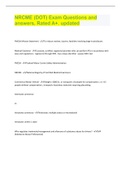NSG 212 exam 4 WVU Huber | Questions & Answers (100 %Score) Latest Updated
2024/2025 Comprehensive Questions A+ Graded Answers | With Expert Solutions
Loss - when someone or something of value experiences change or is no longer accessible resulting in
diminishing or removing of its value
Actual loss - Recognizable to the person experiencing the loss, as well as, other people; death
Perceived loss - Recognizable to the person experiencing the loss but not to others; as someone ages -
they cannot drive and have loss of independence
Anticipatory loss - When a person experiences a reaction to loss that has not occurred yet; bad news
that a disease is terminal
Necessary loss - Related to changes in the life cycle that can be anticipated
Developmental or maturational loss - Normal and expected, results from the normal life transitions in
the developmental process of life, and results in the development of coping skills; going away to college
Situational loss - Unanticipated and caused by external event; hurricane Katrina
Grief - an internal emotional reaction to loss
Mourning - the act of grieving and expressing grief
Bereavement - a state of grieving due to loss of a loved one
Types of grief - -normal/uncomplicated
- dysfunctional/complicated
- anticipatory
- disenfranchised
,Normal (uncomplicated) grief - - may show negative emotions, such as hopelessness, withdrawal, anger,
resentment, and guilt
- over time, negative emotions will change to acceptance with some acceptance being evident by 6
months following the loss
- may demonstrate physical complaints, such as fatigue, change in sleeping patterns, chest pain,
palpitations, nausea, and headaches
Dysfunctional (Complicated) Grief - - also called unresolved grief
- difficult progression through the usual grief stages
- usually prolonged grieving
- may result in decreased self-esteem, intense guilt, and suicidal ideation
- physical complaints may continue for an extended time
Anticipatory grief - The process of starting to "let go" of someone or something before the loss actually
occurs; maybe already grieved for a year or 6 months
Disenfranchised grief - Grief for a loss that may not be considered socially acceptable or cannot be
shared publicly; a friend lost her father to suicide and is not comfortable sharing that or a friend that
passed away from a drug overdose
Grief Reactions - Denial, Anger, Bargaining, Depression, Acceptance
Denial - difficulty accepting the reality of a diagnosis, death, or loss; "they got my x-ray wrong" or "those
aren't my labs"
Anger - Expression of rage and hostility; "why is this happening to me"
Bargaining - An attempt to negotiate for a cure or more time; "I will be good for the rest of my life"
Depression - A period of grief; social isolation
, Acceptance - the reality of the diagnosis, death, or loss is accepted, and the person feels tranquil and
prepared and moves forward to prepare for the future
Factors Influencing Grief and Ability to Cope - - Prior losses
- Significant and type of loss
- Developmental stage; small child and wondering why that person hasn't come back
- Gender; feel like they have to be strong
- Social support and relationships
- Socioeconomic status; paying for a funeral, loss of income
- Spirituality and religion; what you believe makes a difference on what is happening at that time
- Culture and ethnicity; bury your home in food when someone passes
Palliative Care - - appropriate for anyone with a chronic disease or illness regardless of disease stage
- interventions focus on the relief of physical, emotional, spiritual, and psychosocial aspects of disease
- provided by an interdisciplinary team
- Goal is to aggressively manage symptoms in clients with life-threatening illnesses to provide the best
quality of life possible
Hospice - - comprehensive care provided in various settings, often home
- indicated when a client's life expectancy is 6 months or less
- Focus of treatment is shifted from a cure to quality of life and support for the client as they approach
death
- indications for referral may include: co-morbidities, poor performance status (are they able to feed
themselves), poor nutrition, declining cognition, previous hospital admissions, pressure injuries, and
advanced age
Advanced Care Planning - planning for care in the future at times when the client is unable to make
his/her own decisions
Advanced Directives - Legal documents giving direction for situations at end-of-life





